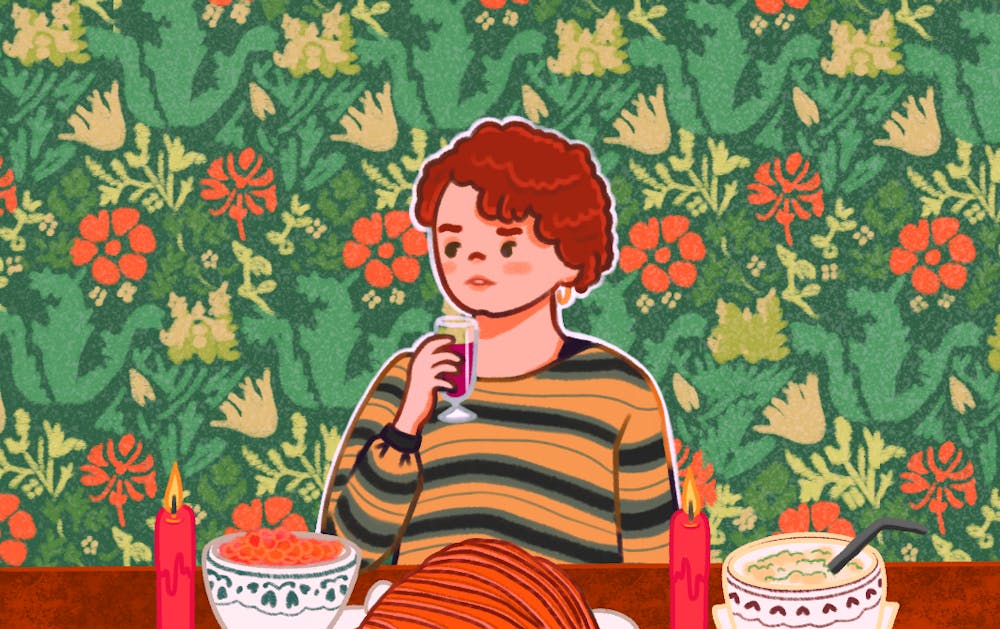When I watched “I’m Thinking of Ending Things,” Netflix's latest horror, I casually started the film while doing my calculus homework, assuming I could be productive while following along in the background. Instead, I discovered that if I let my attention wander for more than five minutes I would lose track of the plot entirely. I was quickly entranced by each peculiar scene and its potential for metaphorical interpretation.
The next day, I brought the film up to a friend, curious about their interpretation of the story’s complex narrative structure. They responded, “That movie is so bad! It sounds super pretentious, and I didn’t understand anything that was going on!”
It seems like, after watching “I’m Thinking of Ending Things,” most viewers’ reactions fall under these two categories. Either you hate the feelings of confusion and disorientation the film undeniably triggers, or you love basking in the endless possibilities of interpretation each new, intricate scene brings.
What kind of film could be so polarizing? Well, as cliche as it may be to say, if there was ever a film you need to see for yourself to understand, this may just be the one.
The film’s director and writer, Charlie Kaufman, is known for crafting bizarre, dizzying screenplays such as “Synecdoche, New York” and “Eternal Sunshine of the Spotless Mind,” that require a lot of interpretive brainwork from the viewer to be fully understood. This time, he’s tasked himself with adapting a psychological thriller novel of the same title by Canadian writer Iain Ried.
With the opening of the first act, the film seems to be nothing more than an obtusely mellow account of an emotionally strained couple navigating a first dinner with the boyfriend's parents. Jake (Jesse Plemons) and his girlfriend (Jessie Buckley) spend the beginning of the film in awkward small talk on a monotonous countryside drive to Jake's childhood home.
As the couple approaches their destination, it becomes difficult to ignore the feeling that something is off: an out-of-character comment here or there, a strange piece of scenery that the camera gives just enough attention to make seem significant, but refuses to fully explain.
From this groundwork, the film slowly and subtly seeps its way into the realm of surreal horror, layering on bizarre and unsettling scenarios until it has conditioned you to passively accept the absurdity of its third act, which is filled with complex choreography and homages to musical theater.
There’s no shortage of metaphorical imagery and double entendre in this film. In fact, it begins to feel like every frame is intentionally symbolic of some greater philosophical message the film has to offer. The only problem is the message is not obvious, and the narrative structure is often so disjointed that it becomes a struggle to understand what is happening to the characters in a literal sense, much less the metaphor behind their actions and dialogue.
I understand and sympathize with the frustration my friend expresses with the content of the film. At two hours and fourteen minutes, it’s a slow burner filled with uncomfortable horror tropes and unsettling, incoherent monologues.
If you approach the film expecting a conventional American cinematic experience with linear plot devices and easily interpretable allegory, then you’re likely to feel shocked and maybe a bit deceived.
Many have accused Kaufman of being obsessed with making the view feel illiterate. Stephanie Zacharek at Time Magazine accused the director and writer of using the film to perform narcissistic tendencies rather than attempting to honor the novel.
"For every moment of raw, affecting insight there are zillions of milliseconds of Kaufman’s proving what a tortured smartie he is," Zacharek wrote.
On the other hand, Kaufman himself has offered personal explanations of the mysteries in his films, while also noting that he welcomes diverse analyses of his work. "I don’t really have expectations about what people are going to think," he said in an interview with IndieWire. "I really do support anybody’s interpretation.”
To me, the foggy ambiguity of interpretation for each scene is what makes the experience of watching the film (and then watching it again and again) appealing. Watching “I’m Thinking of Ending Things” is not a passive experience. Each of the film’s twists and turns prompts the viewer to analyze, theorize and speculate.
If you’re looking for a casual Sunday night flick, “I’m Thinking of Endings Things” probably isn’t for you, and that’s OK. But if you want to actively delve into a complex, heady film and then continue to think about its intricacies for days afterwards, Kaufman’s latest work is waiting patiently to entice you into its outlandish fantasy on Netflix.
Reach the reporter at lexmoulton@gmail.com and follow @lexmoul on Twitter.
Like The State Press on Facebook and follow @statepress on Twitter.




